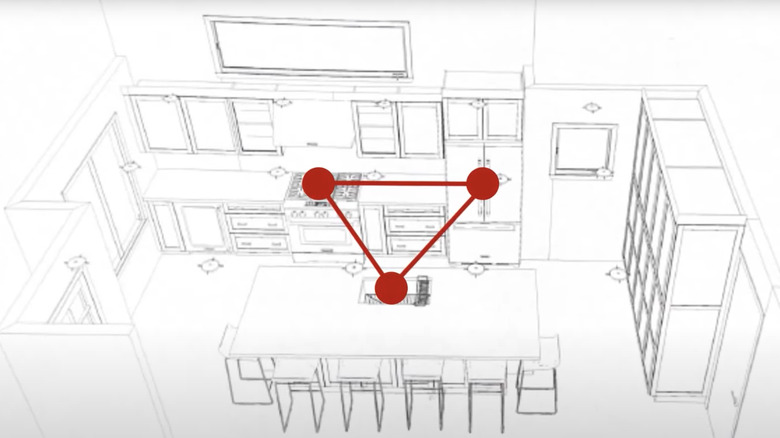The Outdated Kitchen Layout You Have To Stop Relying On
When planning the layout for a new or remodeled kitchen, copious amounts of time, energy, and thought go into making sure the finished space looks incredible and functions flawlessly. Since a kitchen renovation is often a very large investment, every homeowner just wants it to feel right in the end, considering they have spent a lot of money to get to that point. Whether you enlist the help of a design professional, such as myself, to help perfect the layout or you are embarking on that adventure on your own, odds are you will eventually bump into the work triangle rule in your kitchen design process.
This rule, which spells out the exact number of inches your three major work areas should be from each other for maximum kitchen functionality, has become the de facto standard for creating streamlined kitchen layouts for decades. If you have only one person cooking in a small- to medium-sized kitchen, this nearly 100-year-old rule may still work just fine. But if you have a large kitchen, multiple home cooks, or a specialized use of your kitchen space, you will likely find yourself quickly in breach of the old work triangle rule. While the pursuit of creating an extremely efficient kitchen should still be the priority, modern kitchens may require brainstorming layout ideas that go beyond the outdated standards of the work triangle.
What exactly is the work triangle, and why has it been the golden standard?
When it comes to kitchen design, the work triangle was developed to maximize the efficiency of the space by keeping the three main essential workhorses within a reasonable distance of each other: the sink, stove, and refrigerator. If you picture looking at the kitchen from above (like on a floor plan), draw a line between each of those three workstations to form a triangle. The rule states that each segment of that triangle should be between 4 and 9 feet long, with the total distance of all three adding up to between 13 and 26 feet, with no obstructions or cross traffic along the way.
So why was this the gold standard for so long? The goal of the work triangle is efficiency, allowing enough space between elements to maneuver but not so much to sacrifice convenience. In addition, by suggesting that there should be no traffic passing through the triangle or major obstacles along any of the legs, the person using the kitchen can keep moving quickly and unimpeded. Therefore, with the utmost efficiency at the crux of the rule, it became the go-to standard for anyone wanting a super-functional kitchen.
Breaking the work triangle rule
If this work triangle rule is so efficient, why deviate? As an interior designer, let me start by clarifying that the principle behind the triangle is not being debated at all, as functionality and good flow are absolutely crucial to a successful kitchen design. However, with modern kitchens becoming larger and people using them in a wider variety of ways than back in the 1920s when the rule was developed, as with most good things, the standard needs to adapt to the times.
Many kitchen designers and homeowners use multiple work triangles in one space, creating different zones or areas of work. The trend of extra-large kitchens will often break the standard work triangle dimensions just in size alone, so the creation of smaller and more efficient zones within the expansive kitchen works well. This zone approach is also ideal for families that have multiple people cooking at one time, creating separate prep and cooking areas, such as with the use of a prep sink. In addition, for home chefs who use their kitchens with personalized, specific tasks, such as extensive baking or catering for large groups, the layout may break the standard to better accommodate their specific requirements. Therefore, when designing the functional and streamlined kitchen of your dreams, keeping work areas and efficiency at the forefront of your mind is essential. Don't be afraid to break the outdated kitchen triangle rule to make the layout work best for you.


